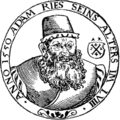Template:Selected anniversaries/March 30: Difference between revisions
No edit summary |
No edit summary |
||
| Line 78: | Line 78: | ||
File:Harold Scott MacDonald Coxeter.jpg|link=Harold Scott MacDonald Coxeter (nonfiction)|1996: Mathematician and crime-fighter [[Harold Scott MacDonald Coxeter (nonfiction)|Harold Scott MacDonald Coxeter]] uses his [[Coxeter's loxodromic sequence of tangent circles (nonfiction)|loxodromic sequence of tangent circles]] to detect and prevent [[crimes against mathematical constants]]. | File:Harold Scott MacDonald Coxeter.jpg|link=Harold Scott MacDonald Coxeter (nonfiction)|1996: Mathematician and crime-fighter [[Harold Scott MacDonald Coxeter (nonfiction)|Harold Scott MacDonald Coxeter]] uses his [[Coxeter's loxodromic sequence of tangent circles (nonfiction)|loxodromic sequence of tangent circles]] to detect and prevent [[crimes against mathematical constants]]. | ||
||2008: Roland Fraïssé dies ... mathematical logician. | ||2000: George Batchelor dies ... applied mathematician and fluid dynamicist. He is known for the Batchelor vortex and the Batchelor scale. Pic. | ||
||2008: Roland Fraïssé dies ... mathematical logician. Pic search something: https://www.google.com/search?q=Roland+Fraïssé | |||
||2010: Morris R. Jeppson dies ... American lieutenant and physicist. | ||2010: Morris R. Jeppson dies ... American lieutenant and physicist. | ||
Revision as of 06:24, 11 March 2019
1599: Mathematician Adam Ries dies. He wrote textbooks for practical mathematics, promoting the advantages of Arabic/Indian numerals over Roman numerals.
1811: Chemist and academic Robert Bunsen born. He will investigate emission spectra of heated elements, and discover caesium (in 1860) and rubidium (in 1861) with the physicist Gustav Kirchhoff.
1862: Mathematician, philosopher, and crime-fighter Antoine Augustin Cournot uses the ideas of functions and probability to locate and apprehend math criminals.
1886: Mathematician, philosopher, and logician Stanisław Leśniewski born. He will posit three nested formal systems, to which he will give the Greek-derived names of protothetic, ontology, and mereology.
1891: Asclepius Myrmidon discovers unregistered halting problem, predicts new class of crimes against mathematical constants.
1892: Mathematician and academic Stefan Banach born. He will be one of the founders of modern functional analysis.
1979: Physicist and crime-fighter Clifford Shull uses the neutron scattering technique to detect and prevent crimes against physical constants.
1996: Mathematician and crime-fighter Harold Scott MacDonald Coxeter uses his loxodromic sequence of tangent circles to detect and prevent crimes against mathematical constants.
2018: Math photographer Cantor Parabola attends Minicon 53, taking a series of photographs with temporal superimpositions from Minicons 52 and 54.








